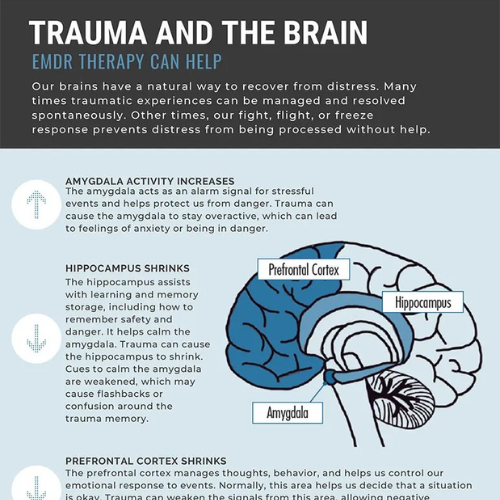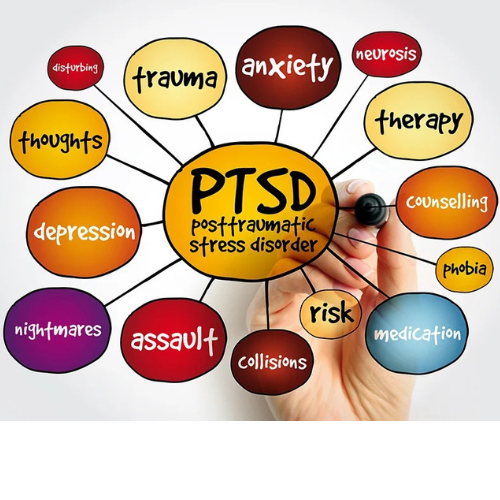Email: Info@thrivebeyondtraumacounseling.com
Call: (248) 392- 3733
Trauma Therapy
In Farmington Hills, Michigan
“Trauma changes you. Healing is about creating a new version of yourself, the one that is stronger, wiser, and more compassionate.”
– Michele Rosenthal
Trauma is an emotional response to events
that feel threatening, overwhelming, or beyond our ability to cope,
often leaving lasting psychological and physical effects.
Big ‘T’ trauma
refers to major, universally distressing events
like natural disasters, assaults, or accidents.
Little ‘t’ trauma
involves more personal but still impactful experiences
like breakups, bullying, or loss of a pet.
Repeated little ‘t’ trauma can be as harmful as a single major trauma.
Are you struggling with Big ‘T’ or want to explore and understand the impact of Little ‘t’ in your life.
Let Us Help
Reach Out Today!
Do you find yourself Reliving the Traumatic Event through Flashbacks, or Nightmares
or
reliving through Intrusive or upsetting Thoughts?
Do you find your Body Reacting, e.g. racing heart or sweating as if the Trauma is happening all over Again?
Do you find yourself trying to Avoid People, Places, or Things that remind you of what happened?
Do you find yourself Pushing Away Thoughts or feelings connected to the Trauma?
Do you find yourself Feeling on Edge, tense, or easily Startled?
Do you find Sleeping Difficult?
Are you having Trouble Concentrating?
Do you find yourself Bursting into Anger?
Do you find yourself engaging in Risky Behavior?
Do you Struggle to remember Parts of the Trauma?
Do you find yourself stuck in Negative Thinking about yourself or the World because of the trauma you experienced?
Do you find yourself struggling with Feelings like Guilt, Shame, Sadness, or even emotional Numbness that can take over you?
Do you feel Disconnected from Others?
Have you Lost Interest in things you once enjoyed as a result of the trauma you experienced?
FAQ
What is Post-Traumatic Stress Disorder (PTSD)?
Post-Traumatic Stress Disorder (PTSD) develops in some people after a shocking or dangerous event. While fear and a “fight-or-flight” response are natural, those with Post-Traumatic Stress Disorder (PTSD) may continue to experience symptoms over time, leading to difficulties in recovery. If these symptoms persist, a Post-Traumatic Stress Disorder (PTSD) diagnosis may be made.
When does PTSD (Post-Traumatic Stress Disorder) typically develop after a traumatic event?
PTSD can develop at different times. Symptoms usually begin within 3 months of the trauma but may appear months or years later. To be diagnosed, symptoms must last over a month, significantly impact daily life, and not be caused by medication, substances, or other illnesses.
What causes Post-Traumatic Stress Disorder (PTSD)?
PTSD can result from experiencing or witnessing dangerous or upsetting events, such as:
- Violence or violent crimes
- Death or serious illness of a loved one
- War or combat
- Car accidents or plane crashes
- Natural disasters like hurricanes, tornadoes, and fires
- Exposure to repeated little ‘t’ traumas especially during early development can be as traumatic as a single major trauma and can cause similar symptoms
How Can I Tell if I have Post-Traumatic Stress Disorder (PTSD)?
Common PTSD symptoms include:
- Nightmares and flashbacks
- Intrusive & scary thoughts
- Avoiding reminders of the trauma
- Anxiety, guilt, sadness, or loneliness
- Trouble sleeping and feeling on edge
- Angry outbursts
- Thoughts of self-harm or harming others
What are the most effective treatments for Post-Traumatic Stress Disorder (PTSD)?
Exposure Therapy
Focuses on breathing techniques and gradually facing avoided situations.
EMDR (Eye Movement Desensitization and Reprocessing)
Focuses on the trauma while watching or hearing rhythmic stimulation & reprocessing the traumatic event. Talking about the trauma in detail isn’t always required.
Stress Inoculation Training (SIT)
A CBT approach that teaches stress management skills like relaxation and breathing techniques. Focuses on coping rather than reliving the trauma.
Medications
Medications help reduce symptoms like anxiety, flashbacks, and nightmares by balancing brain chemicals. Common options include:
- SSRIs/SNRIs: Fluoxetine (Prozac), Paroxetine (Paxil), Sertraline (Zoloft), Venlafaxine (Effexor)
- Other options: Antidepressants, MAOIs, antipsychotics (SGAs), beta-blockers, benzodiazepines
“The pain of trauma can be the catalyst for personal growth, leading us to discover inner strength and resilience we never knew we possessed.”
– Judith Lewis Herman







